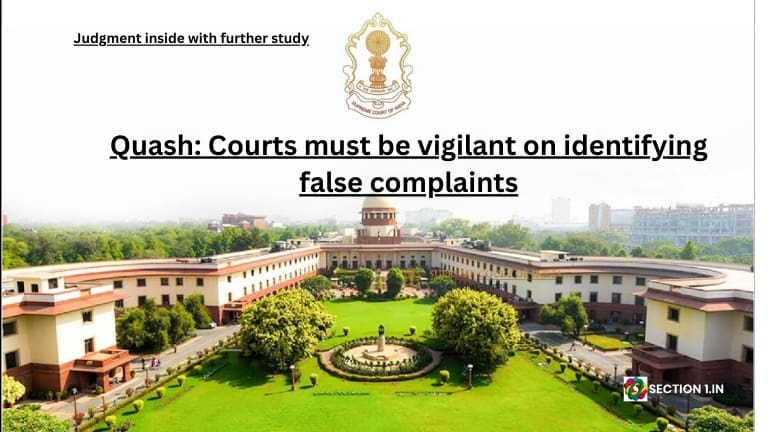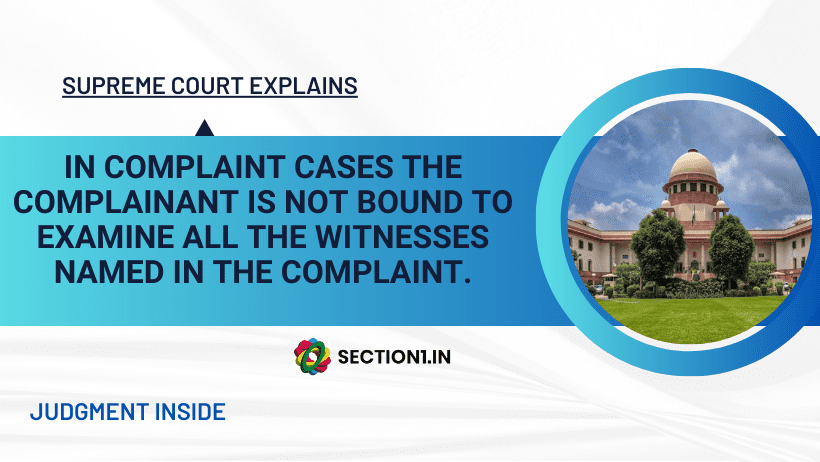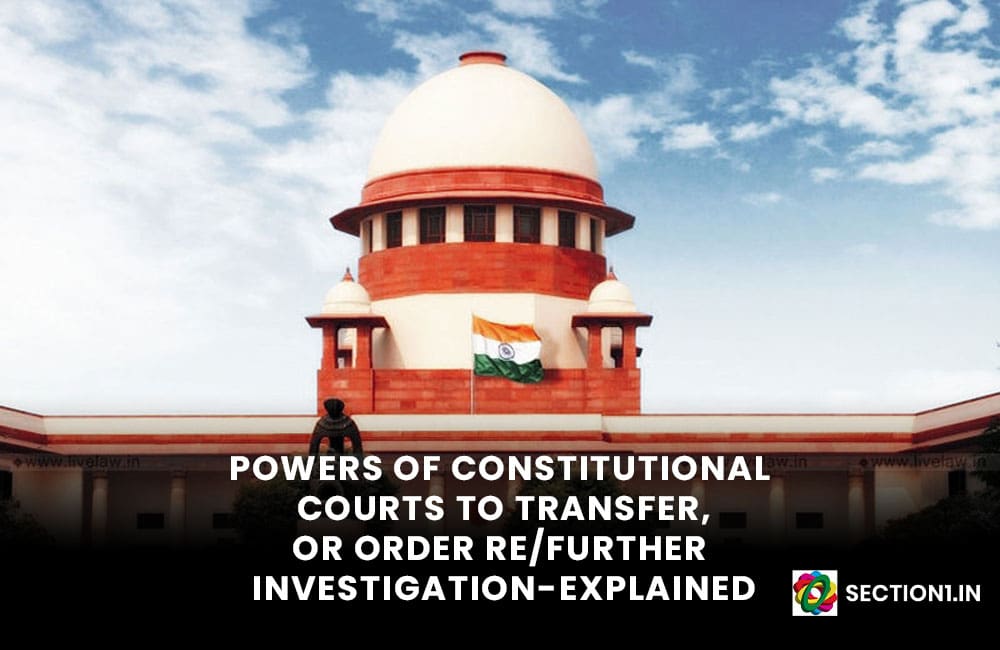ROLE OF DE-FACTO COMPLAINANT DURING INVESTIGATION AND FURTHER INVESTIGATION
SECTION 156 – AFTER TAKING COGNIZANCE
YES: Investigation finished final report (Negative report) filed. Magistrate issued notice to de-facto complainant. Complainant filed a protest petition. On the basis of the same, the statement of the complainant/appellant was recorded. Thereafter the Judicial Magistrate after recording reasons directed the Investigation Officer to examine the complainant with reference to the relevant documents in accordance with section 156(3) Cr.P.C and further directed to conduct proper investigation again by another police officer through the Assistant Commissioner of Police, C.C.B and file a report. The said report was challenged by the respondent No.1. Madras High Court set aside the final report and directed the Judicial Magistrate to proceed with the matter either u/s 203 Cr.P.C or u/s 204 Cr.P.C. Supreme Court has held the above order of the Madras High Court is contrary to the view taken by the three-judge bench of Supreme Court Bhagwant Singh vs. Commissioner[1] and held the Judicial Magistrate was correct[2].
NO: It has to be noticed that the Magistrate was not bound to take cognizance of the offences on receipt of the complaint. He could have without taking cognizance directed an investigation of the case by the police u/s 156(3) of the Code of Criminal Procedure. Once however he took cognizance he could order investigation by the police only u/s 202 of the Cr.P.C, and not u/s 156(3) of the Code of Criminal Procedure. As, it is clear here from the very fact that he took action u/s 200 of the Cr.P.C, that he had taken cognizance of the offences mentioned in the complaint, it was open to him to order investigation only u/s 202 of the Cr.P.C and not u/s 156(3) of the Code[3].
The clear position therefore is that any Judicial Magistrate, before taking cognizance of the offence, can order investigation under section 156(3) of the Code. If he does so, he is not to examine the complainant on oath because he was not taking cognizance of any offence therein[4].
FURTHER INVESTIGATION – DEFACTO COMPLAINANT AND ACCUSED
A prosecution of the Investigating Officer cannot be ordered by the Court under Section 156(3) of the Code of Criminal Procedure merely on such vague allegations as that would demoralise the morale of the police. Similarly, after the cognizance is taken by the Court, further investigation cannot be ordered either at the request of the defacto complainant or the accused[5].
FURTHER INVESTIGATION – DEFACTO COMPLAINANT/INFORMANT
NO – Supreme Court discussing the scope of section 173 & 173 (8) of Cr.P.C held that it was only upon the application filed by the defacto complainant u/s 173 (8) Cr.P.C, was a direction given by the learned Magistrate to re-investigate the matter. As we have already indicated above, such course of action was beyond the jurisdictional competence of the Magistrate. Not only was the Magistrate wrong in directing a re-investigation on the application made by the defacto complainant, but he also exceeded his jurisdiction in entertaining the said application filed by the defacto complainant[6]. It has been categorically held that only based on the application made by the investigating authority, further investigation u/s 173 (8) Cr.P.C could be ordered. However, the Magistrate neither suo motu by himself nor on the application filed by the de-facto complainant, could order for further investigation u/s 173 (8) of Cr.P.C[7]. The law does not postulate any power on the Judicial Magistrate to direct further investigation at the behest of the defacto complainant. Code of Criminal Procedure contains exhaustive schemes, elaborately dealing with powers of police and courts and procedure, in extenso, to be observed by them. When it is not empowered for Judicial Magistrate at the request of the defacto-complainant, he cannot assume power to direct the same[8]. Madras High Court in a decision held that, wherein, it is held that u/s 173(8) Cr.P.C, the defacto-complainant is not entitled to seek further investigation[9].
Yes – In this case after FIR lodged by the Special Leave Petitioner (defacto complainant) respondent 2 to 6 were charge-sheeted. At the time of framing of charge against the respondents, the Special Leave Petitioner has preferred an application for further investigation with a specific averment. Petition was allowed and direction issued to Investigation Officer to further investigate with specific averment. Respondents preferred revision against the direction in Session Court. Sessions Judge partly allowed the revision (set aside the specific order of investigating specific averment, but maintained the Further Investigation order). Special Leave Petitioner against the revision order preferred writ (crl) in High Court. Single Judge was pleased to dismiss the writ. Hence, SLP. Supreme Court dismissing the Special Leave Petition held that in any view, if the investigation conducted by the authorities do not suffer from the lacunae or serious infirmity, we do not see any reason to issue any further direction to the court below to take steps in the matter. It does without saying that all remedies that may be available to the petitioner in accordance with law for recover of her ‘stridhan property’, would surely be made available to her[10].
We respectfully concur with the said view. As we have already indicated, the learned CJM has basically directed for further investigation. The said part of the order cannot be found fault with, but an eloquent one, he could not have directed another investigation agency to investigate as that would not be within the sphere of further investigation and, in any case, he does not have the jurisdiction to direct re-investigation by another agency[11].
The learned Additional Public Prosecutor brought to the notice of this court, the judgment of the Hon’ble Supreme Court in Azija Begum vs. State of Maharashtra and another[12], wherein, further investigation was ordered on an application filed by the defacto complainant which order was ultimately upheld by the Hon’ble Supreme Court[13].
In Bhagwant Singh vs. Commr. Of Police[14], the Supreme Court created a right for the defacto complainant to file a protest application on which a further investigation can be ordered by the Magistrate[15].
In this view of the matter, the view taken by the Hon’ble Supreme Case in Reeta Nag’s case, (supra) that the Police alone can do further investigation has been deviated subsequently by the Hon’ble Supreme Court in Vinay Tyagi’s case (supra) and also in Chandra Babu Vs. State [2015 Cr.LJ 4538]. Now, it is well settled that not only at the instance of the Police, even at the instance of the de facto complainant, further investigation under Section 173(8) Cr.P.C. can be undertaken by the Police to find out the truth of the matter. But, Subordinate Court is not competent to direct fresh, new, de novo investigation, which is entirely different from further investigation[16].
Keeping in view the fact that there is no provision in the Code prohibiting or regulating the power of the Magistrate to order further investigation to prevent miscarriage of justice and following the principles laid down by the Hon’ble Supreme Court in various decisions, I am of the view that the learned Magistrate can order further investigation under section 173(8) of Cr.P.C on the basis of application preferred in this regard by the defacto complainant at any stage irrespective of the stage of pre-cognizance or post-cognizance stage, even after the commencement of the trial[17].
AGAIN NO
After discussing all the above judgments Hon’ble Supreme Court has held that in contradistinction, Sections 156, 190, 200, 202 and 204 of the Cr.P.C clearly outline the powers of the Magistrate and the courses open for him to chart in the matter of directing investigation, taking of cognizance, framing of charge, etc. Though the Magistrate has the power to direct investigation under Section 156(3) at the pre-cognizance stage even after a charge-sheet or a closure report is submitted, once cognizance is taken and the accused person appears pursuant thereto, he would be bereft of any competence to direct further investigation either suo motu or acting on the request or prayer of the complainant/informant. The direction for investigation by the Magistrate under Section 202, while dealing with a complaint, though is at a post-cognizance stage, it is in the nature of an inquiry to derive satisfaction as to whether the proceedings initiated ought to be furthered or not. Such a direction for investigation is not in the nature of further investigation, as contemplated under Section 173(8) of the Code. If the power of the Magistrate, in such a scheme envisaged by the Cr.P.C to order further investigation even after the cognizance is taken, accused persons appear and charge is framed, is acknowledged or approved, the same would be discordant with the state of law, as enunciated by this Court and also the relevant layout of the Cr.P.C. adumbrated hereinabove. Additionally had it been the intention of the legislature to invest such a power, in our estimate, Section 173(8) of the Cr.P.C would have been worded accordingly to accommodate and ordain the same having regard to the backdrop of the incorporation thereof. In a way, in view of the three options open to the Magistrate, after a report is submitted by the police on completion of the investigation, as has been amongst authoritatively enumerated in Bhagwant Singh (supra), the Magistrate, in both the contingencies, namely; when he takes cognizance of the offence or discharges the accused, would be committed to a course, whereafter though the investigating agency may for good reasons inform him and seek his permission to conduct further investigation, he suo motu cannot embark upon such a step or take that initiative on the request or prayer made by the complainant/informant. Not only such power to the Magistrate to direct further investigation suo motu or on the request or prayer of the complainant/informant after cognizance is taken and the accused person appears, pursuant to the process, issued or is discharged is incompatible with the statutory design and dispensation, it would even otherwise render the provisions of Sections 311 and 319 Cr.P.C., whereunder any witness can be summoned by a Court and a person can be issued notice to stand trial at any stage, in a way redundant. Axiomatically, thus the impugned decision annulling the direction of the learned Magistrate for further investigation is unexceptional and does not merit any interference. Even otherwise on facts, having regard to the progression of the developments in the trial, and more particularly, the delay on the part of the informant in making the request for further investigation, it was otherwise not entertainable as has been rightly held by the High Court[18].
The question as to whether, after framing of charges and taking cognizance, it is open to the Magistrate to direct further investigation either suo motu or on an application filed by the complainant/informant is no more res integra. In a recent decision of this court (to which one of us, Justice Dipak Misra was party) in the case of Amrutbhai Shambhubhai Patel vs. Sumanbhai Kantibhai Patel and others[19] after analysing earlier decisions on the point, it has been held that neither the Magistrate suo motu nor on an application filed by the complainant/informant can direct further investigation. Further investigation in a given case may be ordered only on the request of the investigation agency and that too, in circumstances warranting further investigation on the detection of material evidence only to secure fair investigation and trial, the life purpose of the adjudication in hand[20].
FINALLY YES
The learned Additional Public Prosecutor brought to the notice of this court, the judgment of the Hon’ble Supreme Court in Azija Begum vs. State of Maharashtra and another[21], wherein, further investigation was ordered on an application filed by the defacto complainant which order was ultimately upheld by the Hon’ble Supreme Court[22].
In Bhagwant Singh vs. Commr. Of Police[23], the Supreme Court created a right for the defacto complainant to file a protest application on which a further investigation can be ordered by the Magistrate[24].
In this view of the matter, the view taken by the Hon’ble Supreme Case in Reeta Nag’s case, (supra) that the Police alone can do further investigation has been deviated subsequently by the Hon’ble Supreme Court in Vinay Tyagi’s case (supra) and also in Chandra Babu Vs. State [2015 Cr.LJ 4538]. Now, it is well settled that not only at the instance of the Police, even at the instance of the de facto complainant, further investigation under Section 173(8) Cr.P.C. can be undertaken by the Police to find out the truth of the matter. But, Subordinate Court is not competent to direct fresh, new, de novo investigation, which is entirely different from further investigation[25].
Keeping in view the fact that there is no provision in the Code prohibiting or regulating the power of the Magistrate to order further investigation to prevent miscarriage of justice and following the principles laid down by the Hon’ble Supreme Court in various decisions, I am of the view that the learned Magistrate can order further investigation under section 173(8) of Cr.P.C on the basis of application preferred in this regard by the defacto complainant at any stage irrespective of the stage of pre-cognizance or post-cognizance stage, even after the commencement of the trial[26].
The same view was taken by this court in Dilawar Singh vs. state of Delhi[27]. We would further clarify that even if an FIR has been registered and even if the police has made the investigation, or is actually making the investigation, which the aggrieved person feels is not proper, such a person can approach the Magistrate under section 156(3) Cr.P.C, and if the Magistrate is satisfied he can order a proper investigation and take other suitable steps and pass such order(s) as he thinks necessary for ensuring a proper investigation. All these powers a Magistrate enjoys under section 156(3) Cr.P.C[28].
List of judgments
[1] (1983)2 SCC 537
[2] B.Jayaraman vs. V. Anandaraj
[3] Jamuna Singh and others vs. Bhadai Sah – AIR 1964 SC 1541=1964 Cr.L.J 468 (SC)
[4] Mohd. Yousuf vs. Smt. Afaq Jahan & Another – 2006(1) MLJ (Crl) 327(SC)=AIR 2006 SC 705=2006(1) SCC (Cri) 460=2006 Cr.L.J 788 (SC)
[5] P. Sivasubramanian Versus The State Rep. by its, the Inspector of Police, Rajapalayam – Crl. R.C. (MD). Nos. 287 & 288 of 2017 – 14-03-2018.
[6] Reeta Nag v. State of W.B & Ors – (2009) 9 SCC 129=(2009) 4 MLJ (Cri) 1004 (SC)
[7] Sri Saravanan v. D.Ramviji and another – (2012) 3 MLJ (Cri) 601 (Mad)
[8]E.JeevanKumar vs. State & anr – 2011 Cr.L.J 418 (page.423) followed in K.Jackuline Sathya Priya vs. The Inspector of Police – 2013(1) TNLJ 32 (Cri) (Mad)
[9]A.Mohan and Others vs. State – 2012(2) MLJ (Cri) 767 (Mad)
[10] Pooja Abhishek Goyal vs. State of Gujarat & Others – 2014 AIAR (Cri) 664=2014(5)SCALE721= (2014)6SCC404
[11] Chandra Babu@Moses vs. State – 2015(5) CTC 214(SC)=2015(3) MLJ (Crl) 597(SC)
[12] (2013)3 SCC 126
[13] P. Ravindranath Vs. K.Chandragandhi & Others – 2015(3) MWN (Crl) 236
[14] (1985)2 SCC 537
[15] P. Ravindranath Vs. K.Chandragandhi & Others – 2015(3) MWN (Crl) 236
[16] Smuel Jebakani vs. The S.P – 2017(1) MWN (Crl) 403=2017 (1) MLJ(Crl) 51
[17] M.Jayalakshmi vs. State – 2013(1) CLT (Crl) 641.
[18] Amrutbhai Shambhubhai Patel Versus Sumanbhai Kantibhai Patel & Others – 2017 (2) Scale 198=2017 CrLJ 1344 (SC).
[19] (2017)4 SCC 177=- 2017 (2) Scale 198=2017 CrLJ 1344 (SC).
[20] Athul Rao vs. Stat eof Karnataka & Another – Crl.Apl. No: 1367 of 2017 – dated:18.08.2017.
[21] (2013)3 SCC 126
[22] P. Ravindranath Vs. K.Chandragandhi & Others – 2015(3) MWN (Crl) 236
[23] (1985)2 SCC 537
[24] P. Ravindranath Vs. K.Chandragandhi & Others – 2015(3) MWN (Crl) 236
[25] Smuel Jebakani vs. The S.P – 2017(1) MWN (Crl) 403=2017 (1) MLJ(Crl) 51
[26] M.Jayalakshmi vs. State – 2013(1) CLT (Crl) 641.
[27] (2007)12 SCC 641.
[28] Vinubhai Haribhai Malaviya and Ors v. The State of Gujarat and Anr – AIR 2019 SC 5233=2019 (14) SCALE 1=2019 (8) Supreme 523 [3 judge bench].
Further study
Draftsmen intention behind sections 301 & 302 Cr.P.C






